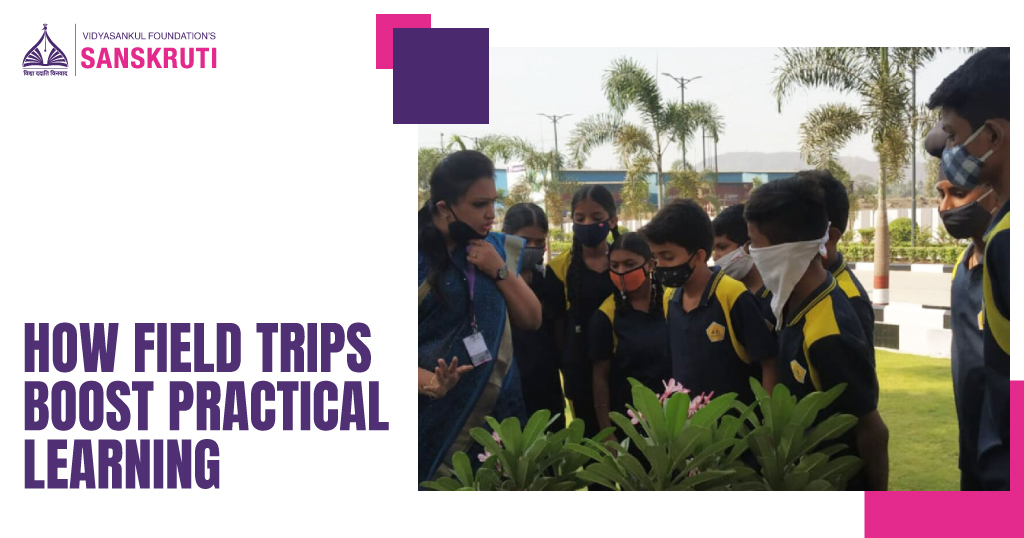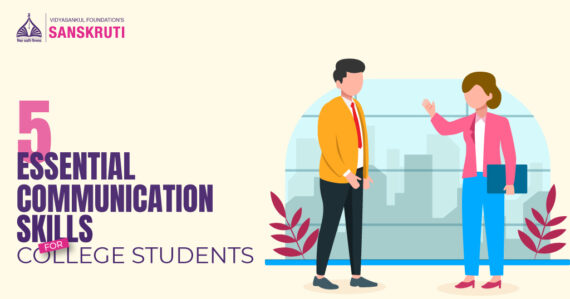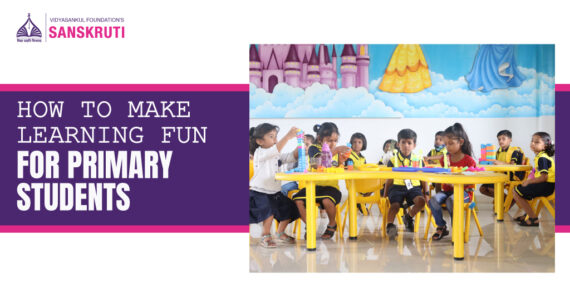Field trips have long been recognized as a valuable tool to complement classroom education. These excursions provide students with experiences far beyond the confines of a traditional academic environment. By stepping out into the world, students gain hands-on exposure, cross-disciplinary insights, and a deeper understanding of concepts that they might otherwise encounter only through textbooks. Practical learning through field trips cultivates curiosity, creativity, and the ability to apply knowledge in real-life scenarios.
At Sanskruti World School, the best secondary school in Boisar, Palghar, field trips are an integral part of our educational philosophy as we allow students to grow beyond theoretical studies and thrive in practical learning environments.
Through this blog, we are summarizing how field trips boost practical learning, their significance, and how they prepare students for a well-rounded future. Below are the key benefits of field trips, explained in detail. Let’s begin.
1. Bridging Theory and Real-world Applications
One of the greatest advantages of field trips is how they connect theoretical learning to the real world. While classroom instruction focuses on educating students through books and lectures, field trips bring these lessons to life. For example, a visit to a historical monument allows students to better understand history, architecture, and culture. Similarly, a trip to a wildlife sanctuary teaches ecological balance and conservation practices in a way that’s much more immersive than studying about it from a textbook.
Seeing and experiencing concepts in real time fosters deeper comprehension. Abstract concepts like geographical formations, industrial processes, or historical events become tangible. These connections make learning more enjoyable and memorable for students.
2. Enhancing Social Interaction Skills
Field trips are crucial for fostering social interaction among students. A classroom setting often limits spontaneous communication and collaborative problem-solving because conversations revolve primarily around curriculum-based subjects. However, field trips offer a break from formal setups and encourage informal learning experiences.
Whether it’s working as a team during science expeditions, exchanging ideas during museum visits, or participating in group activities at an art gallery, students learn to listen, share, and cooperate in new settings. Moreover, interaction with experts during field trips – such as archaeologists, conservationists, or geologists – broadens their perspective and teaches them how to interact in professional scenarios. This exposure is invaluable for personal development, building confidence, and acquiring soft skills.
3. Instilling Curiosity and Experiential Learning
Field trips spark curiosity in children, making them eager to explore and ask questions. Unlike passive learning models, trips provide opportunities to actively engage with their surroundings. For example, in a botanic garden, students often become curious about rare species, their habitat, or their specific roles in the ecosystem. The natural setting stimulates their senses, providing a vivid learning experience that encourages them to explore further.
Experiential learning, which involves observation, experimentation, and critical thinking, greatly benefits students of all ages. Real-world experiences enable them to apply the knowledge gained in school to better understand the dynamics of life outside books. For example, while learning physics concepts like force and motion, students can visit a theme park to study how these laws apply to roller coasters and rides.
4. Encouraging Interdisciplinary Learning
Field trips are unique because they allow students to explore topics across multiple disciplines simultaneously. Unlike traditional classroom methods, where subjects are segmented and studied separately, field trips emphasize the interconnectedness of different fields. For example, a visit to a museum may include aspects of art, design, history, and even science if the museum houses scientific exhibits.
Similarly, industrial visits merge principles of engineering, economics, and environmental science. Students often discover how concepts they learn in different classes interlink in real-world situations. Such interdisciplinary learning broadens their perspective, helping them build new interests and nurturing their creativity.
5. Building Awareness of Local and Global Issues
Field trips are an effective gateway for students to grasp the importance of various local and global issues. For instance, a trip to a water treatment facility helps students understand water conservation challenges and the implications of mismanaged resources. Similarly, visits to recycling plants or ecological parks help students appreciate sustainability and environmental stewardship.
In today’s global context, understanding topics like conservation, cultural diversity, and civic responsibility is crucial for shaping responsible citizens. Field trips provide firsthand exposure to these subjects, enabling students to take ownership of their role in creating solutions. They also recognize how small-scale local actions can influence global outcomes, making them more conscious and proactive learners.
Sanskruti World School prioritizes trips that are not only educational but also enlightening regarding societal and environmental concerns. This prepares students with awareness, empathy, and insights essential for making real-world contributions.
6. Providing a Fun and Safe Learning Environment
Field trips make education exciting by breaking the monotony of routine classroom schedules. Excursions to parks, museums, exhibitions, or science fairs are both fun and educational. While students enjoy their time outside school, they remain in a structured environment that promotes safety and discipline.
Engaging in hands-on activities during trips boosts enjoyment and enthusiasm for learning. For instance, participating in art workshops during a museum tour, observing experiments at a science center, or mining rocks for geology studies creates a sense of achievement and joy in students. Field trips don’t just make education memorable; they foster a love for learning that lasts a lifetime.
At Sanskruti World School, creating a balance between education and fun is one of our core values. With strict safety measures in place, every trip is designed to provide a stress-free learning experience where students feel comfortable, encouraged, and inspired.
7. Developing Critical Thinking and Problem-Solving Skills
Field trips encourage students to deal with real-world challenges, enhancing their critical thinking and problem-solving abilities. Being placed outside the comfort zone of the classroom, students often encounter new situations requiring decisions, adaptations, or creative thinking. For example, on environmental field trips, students might analyze the effects of deforestation or pollution and brainstorm practical solutions.
Such activities not only strengthen analytical skills but also instill confidence in decision-making. Beyond academics, students develop a sense of accountability for their actions on field trips as they navigate new learning environments responsibly.
The Bottom Line
Field trips are more than just excursions—they are a powerful way to bridge theoretical knowledge and practical learning. Through social interactions, interdisciplinary insights, hands-on exposure, and fostering curiosity, students develop skills that prepare them to excel academically, personally, and professionally.
At Sanskruti World School, the best secondary school in Boisar, Palghar, we recognize the transformative effect of such experiences. Our school organizes regular field trips for students to learn by doing—whether it’s through exploring cultural monuments, visiting science centers, or participating in conservation projects. Our programs are designed not only to educate but also to inspire students to think critically, engage creatively, and act responsibly.
We ensure your child benefits from the premier educational experience in Boisar, where field trips and experiential learning are an integral part of our academic framework. Give your child the opportunity to thrive in a dynamic environment that emphasizes curiosity, hands-on exploration, and the joy of learning!
Admissions Open!
SUMMARY:
Discover how field trips can transform learning! Check out our latest blog ‘How Field Trips Boost Practical Learning’ and see why hands-on experiences are key to student growth. Read this blog by Sanskruti World School, the best secondary school in Boisar, Palghar!





